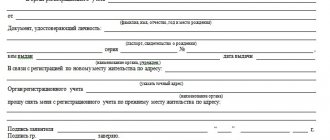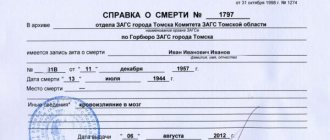We discharge children for various reasons. If you want to discharge a child, you should remember that this can be done by law only in relation to an adult and legally capable son. That is, a citizen should not have a disability group registered. Then it is possible to check him out of the apartment without his consent.
If the son is a dependent, that is, in the care of his parents, or a minor, it is almost impossible to discharge him. You will have to spend a lot of money on legal proceedings.
Exceptions are cases when the son is a minor, but has lived in another apartment or house for many years. Then he has the right to be discharged by his mother without his consent.
Grounds for expelling my son from the apartment
It happens that the mother voices serious reasons for discharging the child from the living quarters. Indeed, I can discharge my son from square meters based on the following points:
- If a child who has not yet turned 18 years of age lives with a second parent who gives his consent to the registration of the child in his living space.
- An adult citizen uses residential square meters for other purposes. This is confirmed by complaints from neighbors, as well as an act describing the deplorable condition of the premises as a result of the tenant’s unlawful actions. There are certain rules for living in a high-rise building. If a person violates them repeatedly and the residents of several apartments are ready to sign the complaint, the complaint becomes a collective one and is submitted to the court by the mother or the police.
The last version of the statement may take a long time. After all, law enforcement first responds to a complaint from neighbors and the mother with a warning for her son. It is not so easy these days to evict a person from his own apartment.
Is it possible to remove a child from an apartment without the mother’s consent?
In accordance with the law, the child must be registered at the place of residence of one of the parents. When a minor is deregistered, his living conditions should not become worse than the previous ones. It is possible to discharge a minor child without the consent of the mother if she is deprived of parental rights or is declared missing. In all other cases, the disagreement of the other party will result in litigation. The court has the right to ask the opinion of a child who has reached the age of 10 years. So the time for deregistration may drag on during the trial.
How to discharge your son with his consent
If close people or relatives want to register in the apartment, your son may also need to be discharged. If the mother agrees to the procedure, the following algorithm of actions must be repeated:
- Make an appointment with a passport office employee.
- Come there at the appointed time with your son. Don’t forget to take documents, without which no one will consider your application for an extract. This list includes the house register and personal passports of the mother and son.
- The specialist will provide you with forms to fill out. If a daughter or other relative is registered in the apartment, this information is not recorded.
- It is also important to fill out a form indicating the citizen’s registration address. According to the law, it is impossible to discharge a person anywhere.
- Can the owner of the apartment discharge a person registered through the passport office without his presence, using his passport? No.
- Hand over the official papers to the passport office employee. Photocopies of documents are sufficient for verification. The originals remain with the owner and are shown only upon request.
Procedure.
The main condition for discharging a child from an apartment is mandatory subsequent registration in the apartment/house where at least one of the parents lives and is registered. This rule applies regardless of the type of housing (municipal, privatized). Schematically, the procedure for re-registration of a child’s place of residence is presented as follows:
- Preparation of papers necessary for the change of registration.
- Obtaining the consent of the guardianship council. Even if it is not required, we recommend that you agree on the issue so that there are no complications later.
- Submission of papers.
- Filling out the departure sheet.
- Deregistration at the old place of residence.
- Submitting documents for registration at a new address.
- Filling out the arrival sheet.
There is also a simplified scheme where it will be enough to contact the registrar for registration - registration. The checkout will happen automatically. In the event of a dispute with guardianship, the discharge and, as a result, the registration of the baby will not be carried out.
The privatization process involves granting the child ownership rights to the share if he participated. To discharge a minor child from a privatized apartment, guardianship permission is required. A condition for issuing a permit is the need to provide the child with similar housing (share).
At the same time, guardianship representatives do not take into account social and subjective factors: housing in a more prestigious area, obtaining benefits from purchase and sale, etc. All that matters is the square. The area provided to a minor must be no less than that which belongs to him by right of shared ownership.
If the purchase of a new home after the sale of the previous one is postponed for a specific period, then in order to obtain permission from the board of trustees, you will need to provide confirmation of the availability of funds in a special bank account intended for the purchase of an apartment. The amount of the deposit must be no less than the value of the minor’s share in the sold apartment. The board of trustees may not take into account the price specified in the purchase and sale agreement, but focus on the market price.
The procedure for expelling a child from a privatized apartment if he is not the owner varies depending on whether the minor refused to participate in privatization or not. If the apartment was purchased and not received during privatization, and the child is not the owner of the share, then the consent of the guardianship council is not required for discharge.
It is still recommended to respect the rights of the child. New housing should not be worse than the previous one. Exceptions to the rule are possible for objective reasons. But this is highly undesirable.
The law fully protects the interests of a minor registered in an apartment owned by the municipality. In this case, permission from the guardianship will be required to discharge the child. You need to obtain consent even if the move is related to the purchase of a new home. The requirements of the guardianship council are standard - the new housing should not be worse than the previous one.
It happens that the board of guardians does not give the go-ahead if the child is not provided with a separate room in the new apartment, but in the previous one there was one, with a general increase in the nominal area. In practice, refusals do not happen often, but before making real estate transactions, it is better to clarify the nuances with the regional guardianship department.
The procedure for removing and registering a minor citizen requires careful preparation of the necessary papers before visiting the FMS directly and submitting applications.
The general package of documents for discharging a child from an apartment includes:
- statement;
- child's birth certificate;
- passports of father and mother;
- departure sheet (arrival for registration).
Additionally, the consent of the second parent is required if they do not live together and the child is under 14 years old. The permit is prepared by a notary. In the absence of the second parent (death, deprivation of parental rights, inability), a supporting document is submitted. If the location is unknown, then an explanatory note is drawn up explaining the essence of the matter.
Title documents for housing are added to the basic package. For privatized housing, this is a certificate of ownership, cadastral passport, house register. For municipal real estate - a warrant or social rental agreement and the tenant’s passport, if he is not the child’s parent.
In all cases, except for the discharge of a child under 14 years of age who is not the owner of a share in a privatized apartment, the consent of the guardian must be obtained. To do this, write an appeal to the regional guardianship department. The following are attached to the application:
- birth certificate;
- documents for the current housing where the child is registered;
- papers for the proposed housing (preliminary agreement);
- parents' passports;
- estimated value of current and proposed housing;
- others.
The guardianship considers the request within 14 days, so consent is required before making transactions, for example, the purchase and sale of old and new housing. Since there is no guarantee of a positive decision of the guardianship council if there is a suspicion of deterioration in living conditions. Key points that representatives of the guardianship department focus on when considering a request:
- whether the number of meters entitled to the child has been preserved;
- is the new housing equivalent to the previous one in terms of amenities;
- whether a new registration is being made at the place of residence of the parents or one of them.
If the number of squares is not enough to make a positive decision on guardianship and the parents live together, then it is possible to register one of them first, after the child, having received consent, and only then the second. This move is available, subject to other aspects.
The refusal of guardianship can be challenged in court, but courts rarely infringe on the rights of minors. Therefore, there is no chance in a standard situation. Acceptable options when a claim will affect the situation:
- provision of a sum of money to the current account before the date of purchase;
- it is necessary to register a child over 14 years old not with his parents;
- the opposing actions of the mother or father are directed against the interests of the child.
We suggest you read: Can I prove during a divorce that the house was purchased during the marriage and not received as a gift?
The turning point age of a child, which affects the procedure for discharge and registration, is reaching 14 years of age. Until the age of 14, a child does not fill out applications for withdrawal or registration, does not present a passport when applying, and does not need to visit the registrar at all. All procedural issues are decided by parents or guardians.
But until the age of 14, a child cannot be registered in an apartment (house) where at least one of the parents is not registered. After 14 years of age, a minor child must be present when submitting applications, as well as write them in his own hand. However, from the age of 14 you can be registered at a different address than your parents.
Control periods are established by law for performing certain actions in order to discharge a minor child from the apartment.
| Event | Term |
| Consideration of the request by the guardianship council | 14 days from the date of application |
| Removing a child from registration | 3 days from the date of application |
| Submitting papers for registration at a new address | 7 days from the date of discharge |
| Removing a child from registration | 3 days from the date of application |
In total, the entire process can take 27 days. The legislator allows an extension of the ten-day period provided for submitting papers to register a child. However, the grounds for an extension (pass) must be valid, that is, excluding the real opportunity for parents to register a child: illness, deferred purchase with a deposit, being away for a long time, etc.
According to Art. 3 of Law No. 5242-1, the functions of registering citizens are assigned to the territorial divisions of the Federal Migration Service of the Russian Federation. You can submit documents in order to discharge or register a child in an apartment using any of the presented methods, choosing the most convenient:
- by personally visiting the local department of the Federal Migration Service of the Russian Federation;
- by sending an application to the MFC;
- by submitting an application through the State Services portal.
There are no restrictions on the choice of payment method. But you can only choose from functioning options, that is, if no method is available in the region other than a visit to the registrar, then you should visit the regional FMS department.
There are two ways to discharge a mother without a child. The procedure is carried out at the passport office or court. In the first case, the woman's voluntary consent is required.
If she doesn’t mind leaving the apartment without the child, then she will need to do the following:
- Visit the passport office at the place of registration.
- Fill out the form for leaving your place of residence.
- Attach the required documents to the application.
If a woman plans to discharge a minor, she must obtain permission from the guardianship authorities.
In this case, the owner will need:
- Fill out and submit the claim to the court.
- Attach to the application documents confirming the reasons for deregistering the woman.
- Obtain consent to the procedure from the guardianship authorities.
- Take part in legal proceedings and obtain a court decision.
The statement of claim must include information about the defendant and plaintiff, as well as the reasons for deregistration of the mother without a minor. Among them are the sale of real estate by the owner.
However, any transactions with an apartment where a minor is registered can only be carried out with the consent of the guardianship authorities.
If the son does not agree to be discharged from the residential premises
If consent for the extract has not been received from the son, and he did not appear with his mother at the territorial division of the passport office, the step-by-step instructions for extracting square meters are as follows:
- The owner of the apartment files a statement of claim in court.
- The court employee issues the applicant with documents that must be provided.
- All that remains is to collect these documents and submit them to the court.
- There is no need to come to court to hear cases. The judge makes a decision on such a case without the presence of the applicant. You will learn about the court decision from a letter that will be sent to your residential address.
How to discharge a mother without a child.
The legislation protects the interests of minor children, so it is almost impossible to discharge him from the apartment where he lives without providing other housing.
But if necessary, you can discharge the child’s mother, while he will remain registered in the apartment.
This is done in two ways:
- through the court;
- at the passport office.
The official will satisfy the claim in the following situations:
- if the woman and the minor live in another place;
- the child remains registered in the apartment with the second parent;
- The owner of a property wants to put it up for sale.
A woman can be discharged from her apartment if she owns another home.
The law stipulates that a minor has the right to live and be registered in an apartment together with any of the parents.
To remove a mother without a child from her apartment, she will need to go to court. He will make a positive decision only if the interests of the minor are not violated.
To deregister a mother with a minor child, there must be compelling reasons.
You can achieve a positive court decision if the following conditions are met:
- the woman and child live elsewhere;
- the owner of the property is not a relative of the mother and minor and wishes to put the property up for sale;
- The woman owns an apartment or house where she can register the child.
It is important to remember that according to the law, a minor cannot be left without a place of residence. Therefore, the procedure requires obtaining consent from the guardianship and trusteeship authorities.
Legally, it is quite possible to expel a mother and child from an apartment. This procedure can be carried out only in certain cases. The fact is that the law cannot allow the existence of a child without a specific place of residence.
In addition, the state has provided for the fact that a child under the age of eighteen must have a residence permit in the residential property where his father or mother is.
But such a conclusion does not mean that the registration of a minor does not attach a legal representative to him.
To deregister as quickly as possible, every effort must be made to avoid legal intervention.
As the experience of our lawyers shows, the judicial system almost always takes the child’s side. Therefore, both sides still need to try to come to an agreement. If it is not possible to reach a joint decision, then the mother and child must comply with the following conditions:
- living elsewhere;
- availability of housing with ownership rights and to live in it at the place of registration;
- if the owner of the apartment is not a close relative of the child and wants to conduct a financial transaction with real estate.
Mother and baby can be discharged using the following instructions. First you need to contact the passport office. Have with you permission from the guardianship and trusteeship authorities, which allows you to discharge the child with his subsequent registration with his mother in the new property.
If the owner of an apartment wants to sell his property, he will need to register all the citizens registered there, including a mother and her baby. To carry out such a procedure, the owner needs to contact the court and take the following steps:
- write a corresponding statement;
- provide the court with all the necessary evidence that will confirm the desire to conduct a financial transaction with your own real estate;
- come to court at the appointed time;
- obtain a court opinion.
The passport office is quite capable of deregistering someone from an apartment with the consent of the owner. This body is capable, under legal circumstances, of deregistering a mother and children if the owner of the residential premises voluntarily consents. If the owner does not want to discharge the above-mentioned people, it is worth contacting the court. It is the court that can deregister without the consent of the owner.
To carry out this operation, the mother will need to take various documents with her. These include: a passport, permission from the guardianship and trusteeship authorities, documents that confirm the ownership of the new home where the child and mother will be assigned, or the consent of another owner.
If deregistration is carried out by a court, you must additionally pay the state fee and provide a receipt for its payment, as well as a corresponding application. Documents must be submitted to the court office or to the passport office, which depends on the current situation.
Registration of a mother and baby at the passport office takes from three days to one week. The timing depends on the workload of workers on specific days. It is also worth noting that extracting through the passport office allows you to avoid paying the state fee, which in court is 300 rubles.
If a claim for an extract is filed in court, it will be considered for approximately one month. After this, a court date will be set.
Taking into account various formalities, the deregistration procedure takes from two to six months. After discharge, the mother will receive a passport with a new registration or a certificate obliging her to register within one month
Thus, the state ensures the rights of children established by law. The baby must live in normal living conditions that will not harm his physical and mental development. Therefore, when it comes to real estate, the state always protects the rights of children.
In order to register a child from father to mother, the following conditions must be met:
- When deregistering, the child must be registered immediately. A new registration is issued exclusively with one of the parents or legal guardians.
- To remove a minor from an apartment, you must have the consent of both parents. If they cannot reach an agreement on the issue, it will have to be resolved in court.
- If it is necessary to register a child in another district or locality, guardianship officials may ask the opinion of the little citizen - if he categorically does not want to move, the parents may be refused to register the little family member.
- Living conditions at the new place of registration of the baby should not be worse than in the father’s apartment.
- If it is necessary to discharge a child from a privatized apartment, you will have to go to court, since the child is the owner of part of the apartment.
If parents are arguing about who a minor should be registered with, the court will decide this issue for them.
Procedure
If the mother and father are married and want to remove the baby from registration in the father’s apartment and register him with the mother, they need to proceed as follows:
- The father's consent is required to register the child with the mother.
- The mother submits an application to register the baby.
- Parents notify the guardianship and trusteeship authority, whose employees monitor the interests of the child and the protection of his rights.
- Adults submit a set of necessary documents to the authorized government agency.
- After the expiration of the period established by law, parents pick up the completed documents.
In the case when the parents of a small citizen are in the process of divorce and cannot decide where their baby will be registered, the procedure should be as follows:
- One of the parents who believes that his rights have been violated files a statement of claim with a request to determine the place of registration and residence of the minor.
- A package of required documents is attached to the application.
- A representative of the guardianship and trusteeship authorities is involved in the trial, assessing the child’s living conditions with each of the interested parties.
- Both parents are invited to participate in the court hearing and must prove the validity of their claims.
- After examining all the materials and evidence, the court makes a decision on where and with which parent the child will be registered.
We suggest you read: Signing a contract with a young child
Documentation
List of documents required for deregistration of a child at the father’s place of residence and his subsequent registration with his mother
- Man's statement;
- His passport;
- Written consent of the child's mother;
- Her passport;
- Metrics of a small family member;
- Certificate of registration of the baby (if the mark is not placed on the back of the birth certificate);
- Extract from the house register;
- Certificate of ownership of the father and title of the mother, if they are the owners of the residential premises in which they are registered;
- Application for registration of a child at a new address (a sample application for registration of a child from the mother is here);
- Written consent of the child if he is over 14 years old and written consent of the guardianship authorities if the child is under 14 years old.
If the parents have not reached an agreement on the registration of the child, the court will decide this issue for them.
When the parents reach an agreement on who the child will live with, these documents are submitted to the authorized government agency. Otherwise, a statement of claim must be attached to this kit along with a receipt for payment of the state duty, and the materials must be sent to the court.
Legislative acts indicate several basic conditions under which the removal of a minor from an apartment is impossible:
- Lack of other housing suitable for raising a child. That is, housing of a smaller area, with worse living conditions. Or simply the lack of other living space.
- If the child is a shared owner of a privatized apartment. Or is its rightful owner on the basis of donation, inheritance, etc.
- With the participation of a child in the privatization of municipal property.
- If there is a controversial housing situation, the child cannot be discharged. This rule applies to mortgaged real estate, division of property during divorce, and inheritance dispute.
- In case of suspicion by government officials of selfish motives of one of the official guardians (parents). In this case, not only will it not be possible to carry out the discharge, but, without fail, additional guardianship is established in order to protect against selfish actions on the part of the interested party. Or an agreement may be concluded on the rules for using the property until the child’s 18th birthday.
- Incompetent citizens. For this category of people, there are special articles in the Civil Code of the Russian Federation, based on which “all real estate transactions are carried out exclusively by a trustee selected from among close relatives, a guardian by birth (parent), etc.” Before conducting a transaction or making a decision to discharge a disabled, incompetent, or mentally retarded child, you must obtain additional permission from representatives of the guardianship authorities. In practice, this does not happen. In the form of additional protection of the rights of incapacitated citizens.
How to make an application to the court
When filling out a statement of claim, the following information is recorded in the text:
- what is the name of the judicial institution where the person applies;
- Full name of the applicant, how to contact him - actual residential address, contact phone number;
- Full name of the son who is being discharged from the apartment, how can you contact him;
- information about a specialist who confirms the legal reason for the citizen’s discharge. This could be an employee of the Federal Migration Service.
When dealing with the question of how you can discharge your son from an apartment in court, it is important to indicate the legislative acts of the Russian Federation that will allow the judge to make a decision in favor of the applicant.
At the end of the application, it is also important to record the list of documents that are attached to the document. The surname indicated by the applicant makes the document eligible. It is also necessary to add the date of the application.
The unbearable living conditions with your son in the apartment are what is important to prove to the court. It is better to enlist the support of your neighbors. This is not difficult to do if the tenant is rowdy and does not allow everyone around him to live in peace. In this case, you cannot do without contacting the police.
How to discharge a minor child from an apartment - procedure, nuances and solutions
- Name of the authority (judicial body to which you are applying);
- Full names, addresses and other contact details of the parties;
- Grounds according to which the child should be discharged. These could be, for example, a long absence of the defendant together with the child from the residence address, systematic failure to pay utility bills, etc.;
- Confirmation of facts;
- The requirement to discharge the child is forced.
Interesting: Where to top up your social card in Moscow for ground transport
The Board of Trustees is obliged to consider the relevant application within 2 weeks to determine whether children's rights have been violated. After this, permission is issued to conclude transactions for the purchase/sale of housing, and therefore to deregister the child at the old address.
What documents may be required by the court?
The court has the right to request from the plaintiff the following documents for consideration of the case:
- Passports of both persons or the passport of the plaintiff and the birth certificate of the son, if the person being discharged is a minor.
- Documents confirming the fact that real estate belongs to a specific person.
- Statement.
- A duplicate of the statement indicating family members.
- Home Book.
- Personal account, which is issued for each apartment separately.
- A certificate stating that the person being discharged is considered missing for a long time (if necessary).
- Documents indicating facts of antisocial behavior of a citizen.
- Neighbors' contact details, if necessary.






